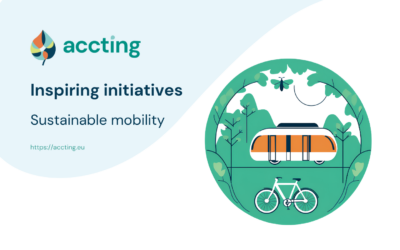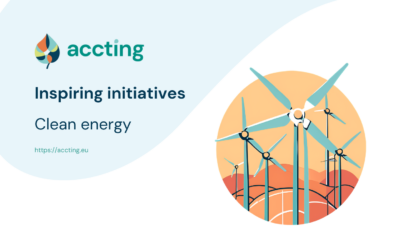The global climate crisis is more than rising temperatures. It impacts individuals, families, collectives of people, economies, and societies. There is growing recognition by the global community that the impacts of climate change are borne disproportionately- Poorer, marginalized, and vulnerable groups who have contributed the least to global warming, are now at the forefront of experiencing the devastating consequences of the climate crisis.
Faced with the ongoing existential threat posed by changes to our climate, the Green Deal confirms EU’s leading role in progressive and horizontal policymaking, which seeks to address environmental, social, and economic inequalities. Given the scale of the challenge, a global commitment is vital to achieving our climate goals. Transformative change, meaning transitions in the behaviour of individuals, communities, and organisations, is a necessary shift to averting or even mitigating this crisis.
ACCTING aims to contribute to producing knowledge and innovation from a gender+ intersectional perspective to advance behavioural change at individual and collective levels, and in related social practices and policies, for an inclusive and equal European Green Deal. ACCTING research is based on eight research lines, generating 41 experimental studies in 13 countries. The research phase includes an extensive mapping and comparative analysis of bottom-up initiatives related to behavioural change and policy making, stemming from groups of people, communities, organisations, active in promoting actions aimed at mitigating and adapting to climate change.
From June to August 2022, 37 national researchers in 34 countries, coordinated by the research team from NTNU, have mapped 693 bottom-up initiatives along the 8 research lines. ACCTING has published a report on these inspiring practice cases of bottom-up initiatives, examining their types and characteristics.
The mapped initiatives are described according to ACCTING’s eight research lines. For each of the following research lines, an analysis of the bottom-up initiatives highlights common themes of implementation, justice profiles and specific barriers and drivers.
ACCTING’s research lines
Climate Action:
1. Valorising local knowledge on natural hazards: Aims to study (and experiment) how local communities are already active actors in the preparedness, prevention, and management of disasters related to natural hazards.
Biodiversity:
2. Land use restrictions: Understand the match of land use restrictions and socio-economic needs of vulnerable groups.
Clean energy:
3. Energy poverty: Support energy communities considering energy poverty and facilitating the participation of vulnerable groups.
4. EEMs/SMEs: How small and micro entrepreneurs can adopt pro-environment behaviours (mainly through a better energy-efficiency) in the context of the GD
Farm to fork:
5. Food security: Improve food security, promote adoption of healthy consumption practices and food waste mitigation, without reproducing inequalities.
6. Food values: Investigates what values are automatically associated with, and relevant for, environmentally sustainable and non-sustainable food, depending on culture (countries), age groups, gender, or key vulnerable groups.
Sustainable mobility:
7. Transport poverty: Understand how sustainable mobility patterns can be obtained without reproducing already existing inequalities.
8. Post-lockdown transport choices: How a more sustainable transport system can be achieved in the context of the GD in case of disruptive events
Overarching Key findings
The majority of the initiatives focus on food, land and energy
Food and land arise to be still priorities and key aspects of a green transition in our societies. The third highly substantial theme is the energy theme, a major issue in the climate crisis and indeed even more in a historical phase such as the current one, which confronts societies with the necessity of transitioning from fossil fuels and ensuring security of supply.
Bottom-up initiatives are mostly led by citizens and community organisations
Most initiatives are led by various actors, principally citizens’ and community organisations, voluntary organisations, NGOs, and micro and small enterprises, suggesting a vitality of the civil society in promoting the green transition. None of this is altogether surprising, as bottom-up initiatives are usually referred to as citizen-led activities. Nevertheless, local authorities and the public sector influence barriers and drivers for many BUIs. They create an institutional environment capable of supporting or hindering initiatives through the level of provision of material and immaterial resources (e.g., information, knowledge) and the characteristics of the regulatory framework they create (legislation, local regulations, policies of intervention).
Main drivers are immaterial resources such as Awareness, Information, Knowledge and Education
These help identify problems, generate solutions, plan and implement initiatives and not least, arising interest in citizens and partner groups and organisations. Along with these,the analysis highlights that contextual drivers and barriers, such as prosocial culture in the community, play a role in supporting collective actions, particularly at the neighbourhood level, where social bonds are active and strong.
The initiatives pay particular attention to vulnerabilities based on income, rural/urban gap, age, and ethnicity
Among the whole set of vulnerabilities, these might affect most of the vulnerable individuals in our society. Yet, this might also suggest that our societies still face a wide problem of distributive justice (Income, Age, Rural vulnerabilities) and recognition justice (Ethnicity, Age groups) that civil society actors consider a priority in promoting the green transition.
The analysis also shows a window of opportunity for learning, knowledge transfer and future research: while there is a relatively low number of BUIs explicitly addressing gender+ inequality issues, they do exist. The challenge for future research is to learn from those BUIs that do address gender+ inequalities and to transfer these insights to those who do not, as well as to translate this knowledge to operational recommendations.
We must have a better understanding of the phenomena of Bottom-Up Initiatives, their role and their potential in the green transition. The gender+ approach presented in this paper is a first step in this direction.
This report, based on desk research, presents evident limitations as a single instrument of social research, and is just a step in a larger research process comprising several research stages within the ACCTING project. As such, it cannot be considered conclusive but only as a step towards a better understanding of the phenomena of Bottom-Up Initiatives, their role and their potential in the green transition. Further, the findings will support our action research development stages promoting a gender+ approach based on the better stories emerged through the mapping analysed in the current report and the qualitative studies conducted in ACCTING.


